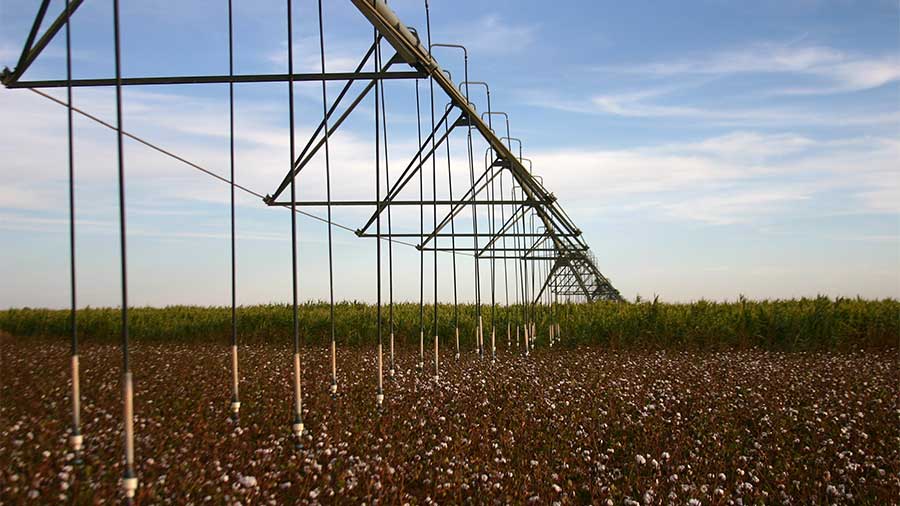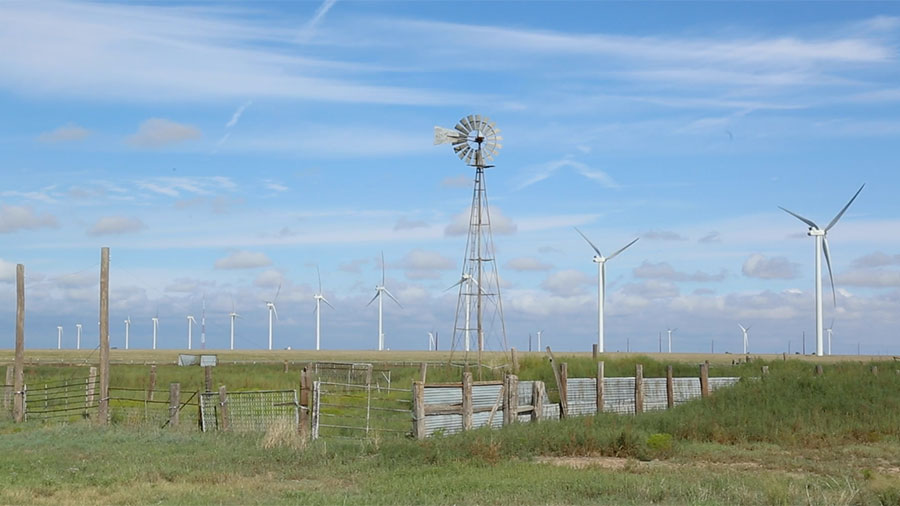Thrive! Rural America Initiative Addresses Challenges Facing Rural Communities
By: Karen Michael
THRIVE! Rural America is a new Texas Tech initiative to address stress due to geographic isolation, urbanization, and changing weather patterns affecting rural residents across the nation.
Situated within rural America, Texas Tech University is responding to rural challenges, with researchers from science, technology, education, innovation, and health coming together to partner with rural communities, civic organizations and industries to develop models for change and innovation.
Texas Tech and Texas Tech University Health Sciences Center researchers are working to address the challenges facing rural Americans, including water supply, energy costs, national teacher shortages, obesity rates, suicide rates, and fewer mental health workers.
"Texas Tech researchers in science, technology, innovation, education, and health are working on dynamic projects with impacts beyond the university and our region," said Joseph A. Heppert, vice president for research at Texas Tech. "Investing in rural America is an investment in our nation's future."
Water
The availability of quality water is perhaps the defining natural resource in rural agricultural areas, according to Danny Reible, the Donovan Maddox distinguished chair in the Edward E. Whitacre College of Engineering at Texas Tech.
"Rural communities need water to thrive," Reible said.
Agriculture requires 70 percent of the fresh water supplies in America, Reible said,
and rural areas are seeing firsthand the increased demands on water.
Reible said the Maddox Engineering Research Center is researching ways to desalinate
water or to remove other contaminants that could be present in water.
"The effort from both cases is to provide water of adequate quality and quantity for the needs of rural America," Reible said. "Rural communities need that water to drive economic development, to ensure that the surrounding agricultural areas have the water they need to produce food and other crops, as well as livestock, that the nation needs."

Venki Uddameri, professor in the Department of Civil, Environmental and Construction Engineering and Director of the TTU Water Resources Center, is also researching how to provide quality water in rural communities. Like Reible, he is working to sustain and prolong the life of the Ogallala Aquifer, which provides water to most of the West Texas region.
Uddameri is also involved in looking at deeper aquifers that lie underneath the Ogallala Aquifer, but are brackish. It is important to find alternative resources of water, as well as to find ways for rural residents to treat their water so that it is useful for agriculture, municipal and industrial uses.
"It has direct impact to rural communities, because having water helps these communities attract businesses and sustain agriculture in this region," Uddameri said.
Agriculture
With water being such a critical resource, Texas Tech researchers are looking for ways to increase water efficiency in crops.
Luis Herrera-Estrella, President's Distinguished Professor of Plant Genomics and director of the Institute of Genomics for Crop Abiotic Stress Tolerance, is working to use cotton as a model system to develop technologies that are applicable to all crops grown in conditions of drought, heat, and salinity.
Herrera-Estrella hopes to develop technologies that will make genetic changes to plants easier and faster.

Genomes of organisms are like a book, he said, and the alphabet of that book is four letters. In building words from those four letters, the order of the letters is what makes the word, and the word is each gene that plays a function, Herrera-Estrella explained.
"If you change the letters, you can change the message. And in that way, you can improve tolerance to drought, or salinity," he said. "But first, you have to understand which letters you have to choose."
Energy
Rural Americans spend a larger percentage of their income on energy bills than the average American family, posing a significant challenge to some families and businesses.
"Upgrading and maintaining the energy infrastructure in those areas is costly for those communities," said Stephen Bayne, professor and associate chair of graduate studies and professor in the Edward E. Whitacre Jr. College of Engineering.
Rural infrastructure has been in place for a long time and needs to be upgraded, Bayne said. In the case of power outages, he said rural communities take a lot longer to get back up on the grid.
Bayne said he is working to increase grid resiliency, integrating solar into weak grids that are far from the energy source, batteries, and microgrids.
"In the long run, we want rural communities to have the same reliability of power as in other communities," Bayne said.
Beibei Ren, associate professor in the Department of Mechanical Engineering, said her research is focused on renewable energy and sustainability.

"The long-term goal is to build community resilience and the energy independence using renewable energy and the microgrid control technologies," Ren said.
Microgrids can provide a speedy solution for community disaster relief and emergency responses when the utility grid is not available, she said. The utilization of renewable energy will help promote energy independence and reduce energy bills in the long run. She has carried out a demonstration project to power a smart home in Junction with solar and wind energy. The home can be powered completely by renewable energy if the utility grid is faulty. Homes like this can be connected to provide rural community support if needed, Ren said.
Health
Texas Tech researchers are working on helping rural health concerns in a variety of ways.
According to Cam Brown, an assistant professor in Couple, Marriage, and Family Therapy at Texas Tech, access to health care is difficult to find for rural residents. Many patients at University Medical Center travel hours from rural Texas areas and even from New Mexico for traumatic injuries.
Stephen Fife, an associate professor in Couple, Marriage, and Family Therapy, said the pediatric trauma center at UMC covers an area of a 300-mile radius around Lubbock, and much of that area does not have a lot of mental health practitioners.
"They come and get the treatment that they need, which is really great because they traveled several hours to be able to be there. But what we have come to learn is that, in regards to follow-up care, it's quite difficult," Brown said.
In collaboration with UMC, Fife and Brown are researching post-traumatic stress or other mental concerns after patients are released and return to their rural communities. Brown said the researchers want to know how they can better support trauma patients, including offering tele-mental health services for patients who live hours away.
"We can check in on them, see how they are doing, and we can strive to be able to reduce symptoms of post-traumatic stress and other mental health concerns that they are encountering," Brown said.
By providing tele-mental health services, Fife said, patients can receive a therapy
session in their own living room.
Recently, Texas Tech opened the Children's Behavioral Health Clinic in connection
with UMC to support children, adolescents and their families in healing from trauma
from medical issues.
Billy Philips, executive vice president and director of F. Marie Hall Institute of Rural and Community Health, is involved in is the Next Generation 911 project. Through the project, he said EMS units in rural West Texas have been equipped with telemedicine equipment and advanced technologies that use cell signals to transmit information ahead of time to the emergency rooms where trauma patients will arrive so that health care workers can begin planning and preparation for that arrival.
"From the time people experience a traumatic injury such as a car wreck or an agricultural accident until the time they reach definitive treatment should be no more than 60 minutes. The idea is to shorten that time period, because it's directly related to survivability," Philips said.
Philips said the F. Marie Hall Institute for Rural and Community Health at TTUHSC is also focused on the development of a predictive index called the Well-Being Index in rural communities to predict the need for more practitioners of every kind, especially mental health providers. The index would also identify gaps in treatment resources, such as critical access to rural hospitals and rural clinics.

Texas Tech research into health concerns such as obesity can also help rural Americans.
Naima Moustaid-Moussa, professor of nutritional sciences and the director of the Obesity Research Institute, or ORI, at Texas Tech, said the national Centers for Disease Control and Prevention have found that rural communities and low-income areas are at a higher risk for developing heart disease, diabetes, and obesity. Rural communities are more likely to experience food insecurity and obesity, she said.
While Moustaid-Moussa said about 40 percent of the nation's adults suffer from obesity, rural communities are disproportionately affected by obesity rates of 46 to 48 percent.
"Our quest to identify strategies to intervene in obesity is higher to the rural communities that are most affected by this disease," Moustaid-Moussa said.
Oak-Hee Park, research assistant professor for the College of Human Sciences, is investigating community nutrition – especially nutrition education for families and school children in rural and underserved communities. Working with the city of Lubbock and the Center for Geographic Information System at Texas Tech, she found that some areas in Lubbock County are "food deserts." She recommended that community leaders increase the number of small grocery stores, implement community gardens, and expand public transportation for easy access to healthy food.
The ORI is poised to make significant research contributions that improve human health, especially in rural communities, Moustaid-Moussa said. The institute's research is translational and multi-disciplinary, and spans from basic studies that provide scientific evidence for lifestyle, environmental, or genetic influences on health, to potential recommendations to be implemented through community education that will empower families and communities to improve their health.
To help rural communities, Moustaid-Moussa said, researchers need to ensure that they have access to healthy food options such as fruits and vegetables, and that those options are safe and affordable to them. Nutrition educators, knowing that health and nutrition literacy is a major limitation in low socioeconomic families, must ensure that people understand the information they are given.
There is urgency and need for attention and resources to improve health in rural America, Moustaid-Moussa said. That population needs regular health screenings, especially for diabetes, blood pressure, and obesity, as well as programs that promote physical activity and healthy eating to reduce obesity and improve overall health literacy and knowledge in rural America.
Education
Robin Lock, a professor in the College of Education, said rural communities face significant challenges in terms of educational opportunities for students, who make up 20 percent of the students in the nation.
"They grapple with preparing and maintaining teachers in their rural communities," Lock said. "They have trouble finding, hiring, and preparing qualified teachers to work with students in their school districts."
Rural schools also struggle to provide a range of academic endeavors for those students, as well.
"They have problems with mental health issues and the beginning of issues with problematic
behavior for children with disabilities," Lock said.
Finally, she said the types of services needed by students with disabilities may not
be available in smaller schools.

Within the College of Education, Lock said teacher and principal preparation are being updated, and those changes are being intensely studied. Texas Tech is looking specifically at how to prepare teachers to survive and thrive in rural America.
Bret Hendricks, associate dean for academic and student affairs in the College of Education, said it is important to listen to members of those communities instead of telling them what they need.
"The concerns that we hear our rural teachers talking about are not necessarily the things that the news reports as being major issues in rural communities," Hendricks said.
While there is a real shortage of teachers in rural Texas communities, Hendricks said sometimes people in rural communities want to stay in their communities, but there are not opportunities for them to stay.
Mental health and a declining state of school buildings is also a problem in education, Hendricks said.
"We want to make life easier in rural communities. We feel very strongly that the fabric of where we come from in West Texas is based upon rural communities," Hendricks said.
Discoveries
-
Address
Texas Tech University, 2500 Broadway, Box 41075 Lubbock, TX 79409 -
Phone
806.742.3905 -
Email
vpr.communications@ttu.edu
